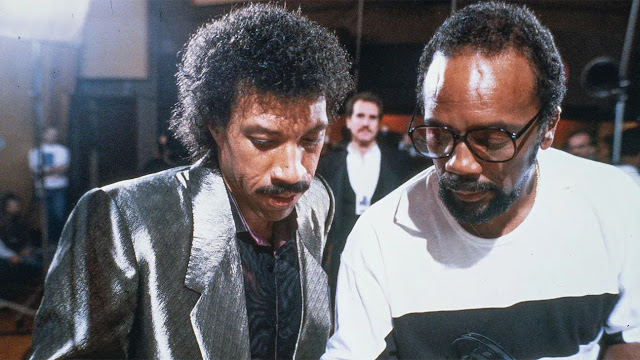The Greatest Night in Pop
I feel like this year's documentary THE GREATEST NIGHT IN POP was made just for me. Of course, many folks my age and some older may feel exactly the same. Has there been a stronger dose of '80s nostalgia than this? When "We are the World", recorded mostly during one long night by a group of superstars called USA for Africa debuted in March of 1985, I was fifteen, fully immersed in pop music and excited that such a lineup could've come together. It was the era of the music industry's consciousness of widespread famine abroad. This multimillion selling single was preceded by "Do They Know It's Christmas" by the UK collective Band Aid and followed by other such supergroups and numerous concert festivals benefiting various charities.
How did organizers Henry Belafonte, Quincy Jones, Lionel Richie, and entertainment manager Ken Kragen get all these artists - who included Michael Jackson, Cyndi Lauper, Willie Nelson, Dionne Warwick, Bruce Springsteen, Huey Lewis, Paul Simon, and Bob Dylan - in one place? Many of the participants attended the American Music Awards that evening and went straight to A & M Recording Studios afterward. Recording began around 10 P.M. and concluded well after sunrise the next day. Historic. We knew it then. There was that ubiquitous iconic video. MTV played the heck out of it. We saw Billy Joel swaying with Kim Carnes and Lindsay Buckingham. Much of the Jackson family (minus Janet) were there. To say it was a cultural phenom is really understating things. I recall when every radio station played the tune at the same time. How amazing and somewhat bewildering it was to twist the dial and hear the song on both country and rock stations.
THE GREATEST NIGHT OF POP soars once we get to the footage of the musicians. Curious to observe the interactions and dynamics. How someone like Bette Midler, who would normally be the center of attention is almost a wallflower among so many other big personalities. Or at least that's what the editing suggests. We also get glimpses of Dan Aykroyd, presumably there due to his participation in the Blues Brothers act. Bob Dylan looks extremely uncomfortable, though how Stevie Wonder eventually inspired his solo is pretty damned awesome.
The candid admissions. Diana Ross getting all fan girl and asking for Darryl Hall's autograph. Lauper's gaggle of jewelry emitting noise on the mic. The controversies: Al Jarreau enjoying too much pre-celebratory wine during recording and Waylon Jennings walking out 'cause Stevie Wonder wanted to sing a verse in Swahili (which is not spoken in Ethiopia, by the way). The film overdubs Waylon's "Dukes of Hazzard" theme song as he exits. And you thought Ross was a diva? Surprised the filmmakers didn't continue the cheekiness and include Richie's "All Night Long" as a certain commentary on the event.
Director Bao Nguyen does some of the usual talking head interviews, current ones with Richie, Lewis, Springsteen, Kenny Loggins, etc. Sheila E. recalls feeling used, as the organizers were trying to get Prince in the studio. You may know how I feel about this style of filmmaking. But how poignant to have Lionel sitting today in the same studio where history was made. Remembering where Cyndi stood. Maybe we've all done that kind of thing somewhere at sometime. The recollections were for an event that raised millions for the hungry, but also for a time gone by, the likes of which are unlikely to be seen again. For me, that was the main takeaway. Can you imagine such an event with today's pop brats? Me neither.




Comments